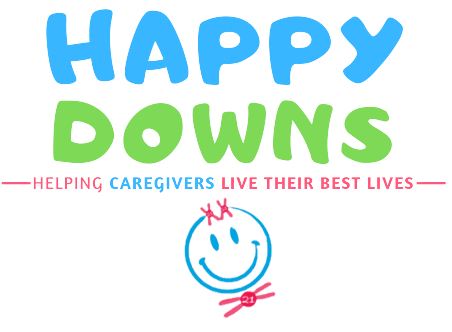Down Syndrome is a genetic condition that affects development in various ways. While each individual experiences it differently, teenagers with Down Syndrome often have the potential for greater independence than they, or even us as Family Caregivers, might initially realize. Nurturing this independence is crucial. It can lead to a significant boost in their confidence, self-esteem, and social skills, all of which contribute to a fulfilling and enriching life.
Understanding Independence
In the context of teenagers with Down Syndrome, “independence” isn’t a one-size-fits-all concept. It’s about gradually empowering them to manage daily tasks and make choices that contribute to their well-being. This might involve anything from mastering personal hygiene routines to navigating public transportation or managing finances.
Setting Realistic Goals:
The key to fostering independence lies in setting achievable goals. These goals should be based on your teenager’s specific abilities and developmental stage. For example, a first step might be mastering independent dressing, while a later goal could involve planning and preparing a simple meal.
Working with Professionals:
Collaborating with professionals like therapists and educators is invaluable. They can provide personalized assessments and strategies to help you develop an individualized plan for fostering your teenager’s independence. Their expertise can be crucial in setting realistic goals and identifying areas where your teen might need additional support.
Building Blocks of Independence
Developing independence in your teenager with Down Syndrome is a gradual process that starts with mastering essential daily living skills. These skills form the foundation for greater autonomy in other areas of life. Here’s how to break down these building blocks:
A. Daily Living Skills:
- Self-Care:
- Focus on manageable steps: Break down larger tasks like dressing into smaller, achievable steps (putting on socks, buttoning a shirt). Use visual aids like picture charts or checklists to guide your teenager through the routine.
- Practice makes perfect: Schedule regular practice sessions for self-care tasks. Start with supervision and gradually decrease it as your teenager gains confidence. For example, you could initially guide them through toothbrushing, then slowly transition to independent brushing with occasional checks.
- Promote hygiene awareness: Integrate age-appropriate hygiene lessons into daily routines. Explain the importance of washing hands, showering regularly, and maintaining oral hygiene. Consider using visual aids or short videos to demonstrate proper techniques.
- Chores and Household Participation:
- Introduce chore charts: Utilize visual chore charts with pictures or simple words to assign age-appropriate tasks. Start with basic chores like setting the table or putting away laundry and gradually increase complexity as your teenager masters each task.
- Positive reinforcement is key: Celebrate successes with praise and encouragement. Consider a reward system based on completing chores independently, but avoid making chores a source of negativity or punishment.
- Meal Preparation:
- Start small: Begin by involving your teenager in simple tasks like setting the table, fetching ingredients, or stirring ingredients in a bowl. Gradually introduce more complex tasks like measuring ingredients or preparing simple snacks under supervision.
- Focus on safety: Always prioritize safety in the kitchen. Supervise your teenager closely when using appliances and teach them basic safety rules like handling hot objects and cleaning up spills.
B. Decision-Making Skills:
- Empowerment through Choice:
- Start simple: Begin by offering your teenager choices between two appealing options (e.g., “Would you like to wear the blue or green shirt today?”).
- Increase complexity gradually: As your teenager demonstrates comfort with simple choices, gradually introduce more complex options that involve weighing different factors (e.g., “Do you want to play outside or stay in and read a book?”).
- Explain consequences: Briefly explain the potential consequences of each choice in an age-appropriate manner. This helps your teenager understand the impact of their decisions.
- Positive Reinforcement for Independent Choices:
- Celebrate successes: When your teenager makes independent choices, be sure to acknowledge and praise them. This reinforces their confidence and encourages them to continue making decisions on their own.
- Learning from setbacks: If your teenager makes a choice that leads to an undesirable outcome, use it as a learning opportunity. Discuss what happened and help them understand how a different choice might have resulted in a better outcome.
C. Time Management and Organization:
- Visual Aids for Planning:
- Introduce visual calendars or planners: Utilize calendars or planners with pictures or simple words to help your teenager visualize their schedule. Mark down important events like school appointments, after-school activities, or deadlines for assignments.
- Create routines: Establish consistent routines for daily activities like waking up, getting dressed, and packing backpacks. This helps your teenager develop a sense of time management and predictability.
- Mastering Time Tools:
- Timers and alarms: Introduce the use of timers and alarms to help your teenager manage their time during chores or homework sessions. Start by setting short timers and gradually increase the duration as they gain comfort.
- Packing practice: Practice packing backpacks or organizing belongings independently. Initially, you can provide a checklist to guide them, but gradually transition to independent packing with occasional checks.
By focusing on these building blocks, you can equip your teenager with the essential skills needed to navigate daily life with greater independence. Remember, progress may not always be linear, so celebrate each milestone and provide ongoing support and encouragement along the way.
Enhancing Independence in Different Areas
Building on the foundation of daily living skills, decision-making, and time management, you can further empower your teenager with Down Syndrome to be increasingly independent in various aspects of life:
A. Education:
- Advocate for Inclusion: If possible, advocate for inclusive learning environments where your teenager can learn alongside their peers. These settings promote social interaction and a sense of belonging.
- Beyond the Classroom: Encourage participation in after-school activities or clubs that align with your teenager’s interests. This can be a fantastic way to develop social skills, explore hobbies, and build confidence in a supportive environment.
- Supporting Learning at Home: When it comes to homework, help your teenager develop organizational skills. Break down assignments into smaller tasks and create a dedicated study space with minimal distractions. Utilize visual aids like timers or checklists to manage time effectively.
B. Transportation:
- Gradual Exposure: If public transportation is a goal, start with gradual exposure in controlled settings. Accompany your teenager on familiar routes initially, allowing them to observe the process (buying tickets, boarding the bus).
- Exploring Ride-Sharing Services (with Supervision): For teenagers with access to mobile devices, explore using ride-sharing services with appropriate supervision. This can offer them greater mobility and independence, but ensure they understand safety precautions like verifying the driver’s identity before getting in the vehicle.
- Safety First: Teach your teenager basic safety guidelines for navigating traffic. This includes looking both ways before crossing the street, using designated crosswalks, and maintaining awareness of their surroundings when waiting for public transportation.
C. Finances:
- Building Money Concepts: Introduce basic money concepts like saving and spending in an age-appropriate way. Utilize games or real-life scenarios (e.g., budgeting for a movie ticket) to make learning engaging.
- Managing Allowances: Consider providing your teenager with a small weekly or monthly allowance. Encourage them to manage their allowance independently, making small purchases or saving towards a desired item.
- Supervised Debit Cards: As your teenager demonstrates responsible money management, you can gradually introduce the use of a debit card in controlled settings. Accompany them on shopping trips initially, guiding them on making informed purchases and tracking their spending.
Remember, the pace of progress will vary depending on your teenager’s individual capabilities. The key is to provide a supportive and encouraging environment that allows them to gradually gain confidence and independence in different areas of their life.
Overcoming Challenges
The journey towards independence won’t always be smooth sailing. There will be moments of frustration for both you and your loved one.
- Acknowledge setbacks: Recognize that setbacks and occasional resistance are normal parts of the learning process. Avoid getting discouraged; instead, use these moments as opportunities for positive reinforcement and renewed guidance.
- Patience is key: Developing independence takes time and patience. Celebrate even small victories and avoid comparing your teenager’s progress to others.
- Supportive, not overprotective: Strike a balance between offering support and avoiding over-protectiveness. While it’s natural to want to shield your teenager from challenges, allowing them to face manageable obstacles fosters resilience and confidence.
- Celebrate small wins: Big or small, every step towards independence deserves recognition. Celebrate their successes, no matter how minor they may seem. This positive reinforcement motivates them to keep striving for greater autonomy.
Independence Is Achievable
Fostering independence in your teenager with Down Syndrome empowers them to lead a fulfilling and enriching life. By focusing on achievable goals, building essential skills, and providing ongoing support, you can equip them to navigate daily life with greater confidence and self-sufficiency. Remember, the journey towards independence is a collaborative effort. Celebrate your teenager’s progress, embrace challenges as learning opportunities, and enjoy the rewarding experience of watching them blossom into a capable and independent young adult.
This blog post is just a starting point. Share your own experiences and tips for fostering independence in the comments section below! What strategies have worked well for your teenager? What challenges have you encountered, and how have you overcome them?
Additionally, subscribe to our blog for more informative content and resources dedicated to supporting caregivers of teenagers and adults with Down Syndrome. Together, we can empower our loved ones to reach their full potential and thrive!





